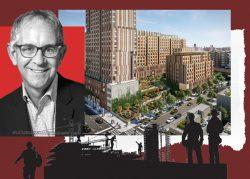Construction unions negotiate project-by-project to get their workers hired, sometimes securing last-minute promises from developers but other times losing out.
Two City Council bills could save unions the trouble of behind-the-scenes wrangling by setting wage requirements upfront for certain projects.
But the bills are backed by different unions and take dramatically different approaches. Only one has a chance to get buy-in from developers.
One of the measures, the Construction Justice Act, requires construction workers wages and benefits worth at least $40 per hour at certain housing projects. At least $25 of that must be wages.
Under the bill, initiated by laborers’ union Local 79, projects that receive financial assistance — potentially including subsidies and tax incentives — must abide by these wage requirements.
The bill has not been introduced yet, and the union is still negotiating the thresholds for financial assistance and number of apartments that would trigger the requirements. Developers could avoid these rules by hiring workers from a state apprenticeship program — a provision aimed at incentivizing the hiring of union workers.
The measure, sponsored by Council member Carmen De La Rosa, requires developers to make a “best faith effort” to hire workers from a “target population,” defined as residents of public housing, women, people formerly or currently on parole or probation and those who live in zip codes where at least 15 percent of the population live below the poverty line.
At least 40 percent of the construction hours should be worked by members of that “target population, and 10 percent should be worked by women, the bill says.
“All construction workers, regardless of incarceration histories or immigration status, should earn a just living building more affordable housing, and get a real chance to call these new apartments home,” Mike Prohaska, business manager of Local 79, said in a statement.
However, developers often push back against bills that elevate labor costs above a level they say would allow affordable housing projects to pencil out. The other measure, backed by the New York City District Council of Carpenters, sets higher wage requirements and would have to overcome industry opposition to pass.
The bill, dubbed the Fair Share Act, would require prevailing wages and benefits on projects receiving $1 million or more in city financing and that are larger than 50,000 square feet, or in the case of residential projects, have more than 50 units.
A similar measure was introduced by then-City Council member Elizabeth Crowley in 2015. Subsequent introductions of the bill have failed to go anywhere. Council members tend to support higher wages but fear making affordable housing projects too difficult to finance.
The Building Trades Employers’ Association, now helmed by Crowley, supports the bill. The organization, which represents construction management firms, has always favored union labor but its members have also run open-shop construction sites, meaning they have also hired nonunion workers.
When Crowley took over the organization, she said she would focus on building unions’ market share.
The bill was reintroduced this month by Council member Kevin Riley.
“Developing hundreds of thousands of affordable units is going to require billions of dollars of public subsidies, but we need to make sure that these tax dollars are being redistributed into the community,” Riley wrote in an op-ed for City & State.
The Real Estate Board of New York supports some of the goals of the laborers’ bill, though it has not endorsed the measure, believing that changes are needed. The trade group thinks the carpenters’ union bill, however, is unworkable given the high level of prevailing wages.
One affordable housing developer told The Real Deal that he viewed setting a $40-an-hour wage floor as a reasonable way to lift up wages for the lowest-paid construction workers.
“We don’t think it really will break the bank on projects,” he said.
The cost of prevailing wages and benefits, however, are much higher. For construction laborers it is around $94 an hour, and $114 per hour for heavy construction carpenters.
Kevin Elkins, political director for the carpenters, commended Riley for reintroducing the bill and getting more than 40 co-sponsors. He believes the 51-member City Council is the “most pro-union” body in recent memory.
“The industry does not set the legislative agenda for workers, the Council members do,” he said. “We need to take aggressive action to protect those workers who do not have the benefit of union protections.”
The bills come as developers shy away from ground-up construction, given high interest rates, other costs and in the case of multifamily construction, the expiration of the 421a tax break. The passage of Riley’s bill would likely mean more city subsidy would be needed to cover the increase in labor costs.
As jobs increasingly went to nonunion workers in the 2000s and 2010s, both unions have negotiated with developers to hold onto market share. For the laborers, the affordable housing market has been particularly difficult to crack. The union has previously reached agreements with individual developers at lower than their usual wages to secure affordable housing projects.
Read more



